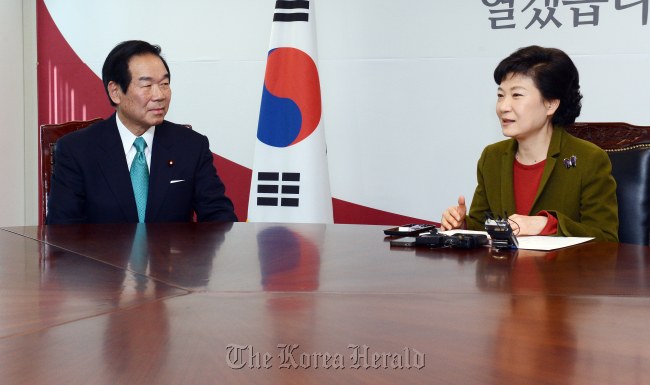Park urges Japan to face up to history
Chinese attacker leaves for Shanghai following release from Korean court
By Korea HeraldPublished : Jan. 4, 2013 - 20:20
President-elect Park Geun-hye on Friday called on Japan to face up to history and make joint efforts to forge a future-oriented bilateral relationship during her meeting with the special delegation sent by Japan’s Prime Minister Shinzo Abe.
“It is important to face up to history and strive for a future of reconciliation and cooperation, and for the two countries to consistently accumulate trust,” she told the four-member delegation, including Japan’s Ambassador to Seoul Koro Bessho and former Finance Minister Fukushiro Nukaga.
Adding that she hoped Seoul and Tokyo could forge closer relations, Park also said that the older generation should have the determination to “heal the wounds and not become a hurdle for the next generation in opening a righteous direction.”
Nukaga agreed, stressing the importance of deeper bilateral cooperation.
“Seizing on the launch of the two new governments as an opportunity, I hope that we can make full-hearted efforts for the fresh bilateral relationship,” he said. “This is important not just for the bilateral ties, but also for peace and stability in East Asia.”
“It is important to face up to history and strive for a future of reconciliation and cooperation, and for the two countries to consistently accumulate trust,” she told the four-member delegation, including Japan’s Ambassador to Seoul Koro Bessho and former Finance Minister Fukushiro Nukaga.
Adding that she hoped Seoul and Tokyo could forge closer relations, Park also said that the older generation should have the determination to “heal the wounds and not become a hurdle for the next generation in opening a righteous direction.”
Nukaga agreed, stressing the importance of deeper bilateral cooperation.
“Seizing on the launch of the two new governments as an opportunity, I hope that we can make full-hearted efforts for the fresh bilateral relationship,” he said. “This is important not just for the bilateral ties, but also for peace and stability in East Asia.”

Their meeting came a day after a Seoul court rejected Japan’s request to hand over a Chinese national who attacked a controversial war shrine in Tokyo in 2011. Some raised concerns that the ruling could affect the bilateral relationship.
Park turned down Abe’s earlier proposal for the meeting in December, citing a tight schedule.
One of the major diplomatic tasks awaiting Park is to manage the shaky ties with Japan.
With security hawk Abe having returned to the premiership last month, concern has been rising that his government of ultra-conservative ministers would spur Japan’s rightward shift and escalate territorial and historical disputes with Seoul and Beijing.
Public sentiment against Japan has worsened in recent years due to Japan’s repeated claim to sovereignty over Korea’s easternmost islets of Dokdo, its distortion of historical facts, and failure to apologize to Korean women forced into sexual slavery during World War II.
During the election campaign, Abe’s party made a series of pledges that sparked concerns of regional tension.
The pledges included elevating the status of the Self Defense Forces to a national defense force; setting up a national security council to handle territorial disputes and other issues: and seeking the collective self-defense right ― the use of force to respond to an attack on an ally, such as the U.S.
Liu Qiang, the 39-year-old Chinese man, who allegedly hurled a Molotov cocktail at the Yaskuni in December 2011, flew to Shanghai on Friday morning.
The Seoul High Court rendered the ruling on Thursday, indicating that he threw it into the controversial shrine honoring Japanese war criminals with a “political motivation” that could put him at the risk of persecution.
Seoul officials said they respected the court ruling, underscoring the democratic separation of the executive, judicial and legislative powers. They apparently believe that it is inappropriate to regard the ruling as a diplomatic issue.
Qiang served a 10-month jail term here for throwing a Molotov cocktail into the Japanese Embassy in Seoul last January. Tokyo made the request to hand him over to it last May.
Meanwhile, Seoul’s Foreign Minister Kim Sung-hwan said that improving the relationship with Japan will be one of this year’s biggest foreign policy tasks.
At a meeting with former career diplomats, he said, “Bilateral relationship should develop in a future-oriented fashion while Seoul continues its efforts to preserve territorial integrity and urge Japan to have an accurate understanding of history.”
By Song Sang-ho (sshluck@heraldcorp.com)
-
Articles by Korea Herald










![[KH Explains] Naver’s Line dilemma: Lose global footing for cash?](http://res.heraldm.com/phpwas/restmb_idxmake.php?idx=644&simg=/content/image/2024/05/14/20240514050624_0.jpg&u=)
![[Herald Interview] Carbon breakthrough in Korea: Making diamonds at atmospheric pressure](http://res.heraldm.com/phpwas/restmb_idxmake.php?idx=644&simg=/content/image/2024/05/14/20240514050559_0.jpg&u=20240514184059)







